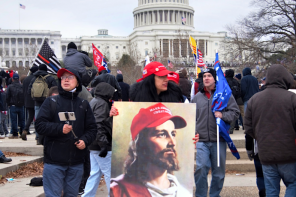Below is an addendum to today’s feature “New Book Reveals How Faith is Like a Covert Operation for the Bush Family”. The book discussed is Russ Baker’s: Family of Secrets: The Bush Dynasty, the Powerful Forces that Put it in the White House, and what Their Influence Means for America (Bloomsbury Press, 2008)
Baker has unearthed many startling facts about the careers of Bush 41 and Bush 43. He also draws some head turning conclusions about some of the key figures in both the Watergate scandal and the assassination of John F. Kennedy and the relationship of Poppy Bush to both events. But before we summarize some of the book’s major disclosures, it is worth discussing the elephant in the room (For a full analysis of the revelations regarding the religious life of the Bushes, see today’s feature: ).
Investigative works are often labeled “conspiracy theories.” This term is generally used to suggest that whatever an author has learned, he or she may be a bit unhinged, and we may therefore not take the material seriously. And we are safe to go about our business as usual. While there are people and work, no matter how well intentioned to which the label might fairly apply, the label is also used by many of us to dismiss information and analyses that make us uncomfortable even when they legitimately push the boundaries of our understanding of modern politics, business and government. But as we address our own discomfort in the face of such material, we need to remind ourselves that investigative journalism discomfits the author as well. Journalists like Baker are constantly checking and cross checking, making sure that disturbing information is in fact so. Even more awkward are the disturbing questions that the journalist cannot answer, but are themselves so well founded that they must be raised. Conspiracy theorists tend to take the opposite tack. Information is shaped or interpreted to conform to predetermined and often fevered conclusions, while countervailing information is downplayed or ignored.
Baker is a well-respected journalist who has written for major newspapers and magazines and has served as a contributing editor of the Columbia Journalism Review. His effort to understand the lives of the presidents Bush unexpectedly led him to reexamine Watergate and the Kennedy assassination and other murky episodes of recent American history, “documenting the secrets that the House of Bush has long sought to obscure.”
“I’ll admit it,” Baker writes in his conclusion. “Fear of being so labeled has haunted me throughout this work. It’s been an internal censor that I’ve had to resist again and again. And also an external one, as friends within the journalistic establishment reviewed my findings, found them both credible and highly disturbing, and yet urged me to stay away from them for my own good. I began to realize that I was experiencing the very thing the process is designed to induce. The boundaries of permissible thought are staked out and enforced. We accept the conventional narratives because they are repeated and approved, while conflicting ones are scorned. Isn’t this how authoritarian regimes work? They get inside your mind so that overt repression becomes less necessary.”
“Whose interests does this serve?” he continues. “As this book demonstrates, the deck has long been and continues to be, stacked on behalf of big money players, especially those in commodities and natural resources *from gold to oil *and those who finance the extraction of these materials. The defense industry, and the aligned growth of business of “intelligence,” provide muscle. On a lower level is an army of enablers*the campaign functionaries, the PR people, the lawyers. This was the Bush enterprise. The Bushes embodied it as a dynasty, but it is larger than them, and will prove more enduring.”
Here are some of the major revelations of the book:
*George H. W. (“Poppy”) Bush, and many of his closest associates throughout his adult life were deeply and secretly enmeshed in covert intelligence activities. He has gone to great lengths to conceal many of his activities, no matter how mundane, and engaged in overt acts of misdirection. Bush’s extensive intelligence ties prior to his becoming CIA Director in the Ford administration, and going back to World War II, have not been previously reported. Baker calls this Bush’s “double life.”
*Poppy Bush was deeply involved with an array of CIA covert operators, Bay of Pigs veterans and rightwing Texas oil industry characters linked to the assassination of John F. Kennedy. Baker shows that Bush was actually in Dallas on November 21, 1963 and was probably there on the day of the assassination as well. Baker draws no particular conclusions from the fact, except to document, describe and underscore the great lengths he went to conceal the fact.
*Baker asserts that, much to his own surprise, Richard Nixon while no innocent, was not the instigator of the Watergate crimes and the cover-up, but appears to have been set-up. What’s more, some of the seeming good guys, were not, and much of what seemed to be, was not as it seemed. Among those he implicates in the set-up are Poppy Bush and perhaps most remarkably, John Dean, the former White House counsel who became best known as the key whistleblower.
*In a related point, Baker notes that Nixon suspected the CIA of infiltrating his White House staff. Nixon recognized the Watergate burglars from his own days supervising covert operations as Vice President in the Eisenhower administration, and knew that their bosses were seasoned CIA hardliners with ties to the Bay of Pigs invasion and events linked to the assassination of John F. Kennedy. Nixon battled the CIA for files on what he called the “Bay of Pigs thing,” but never could get access to them. (To borrow from Woody Allen, just because Nixon was paranoid, doesn’t mean they were not out to get him.)
*Baker questions the integrity and independence of famed Watergate reporter Bob Woodward of the Washington Post who he reports had been recommended for his job by senior Nixon White House officials who had known him when he worked in Naval intelligence prior to his becoming a reporter. In that capacity, which Woodward denies he held, he was a frequent visitor to the White House.
*Baker details the Bush family’s personal, political and business connections to the Saudi royal family; and to apparent international slush funds and money laundering schemes. Much of this is told in such a matter of fact fashion that it is easy to lose sight of the significance of many of the individual facts.
Regarding George W. Bush, in addition to the manufacture of the legend his conversion story (see main story) the book covers familiar turf regarding how strings were pulled to get George W. Bush into the “Champagne Unit” of the Texas Air National Guard in order to avoid military service that might send him to Vietnam; how he failed to fulfill that service; and how his failure was systematically covered-up and politically defused. Also covered are the allegations of how W. was an abuser of illegal drugs in addition to his apparently drinking problems as a young man.
One important story from W.’s past that has long been rumored is confirmed in this book. It is a story that perhaps as much as his going AWOL from the National Guard and orchestrating a cover-up could have derailed his political career.
And that story is the illegal abortion he obtained for a girlfriend in Texas before Roe v. Wade. This is substantiated in part by four reporters whose stories were not published, but who shared their “experiences and detailed source notes” and even tapes with him. Two Bush pals took charge of arranging the abortion go to the hospital and who went to the hospital to inform her that he would not see her again. All of the names are named. Certainly as an candidate who was seeking to appeal to conservative evangelical, anti-abortion constituencies, this would have been a high hurdle to overcome.
“As president,” Baker concludes, “Bush promulgated tough new policies that withheld U.S. funds not only to programs and countries that permitted abortions, but even to those that advocated contraception as opposed to abstinence. Moreover, his appointments to the Supreme Court put the panel on the verge of reversing Roe v. Wade. Like his insistence on long prison sentences for first time drug offenders and his support for military action, his own behavior in regard to sexual responsibility and abortion could be considered relevant *and revealing.” Such journalistic understatement is typical of Baker’s narrative, even while reporting potentially politically explosive material.
Perhaps the revelation that would be most difficult for readers will not be anything about the Bush family, or Watergate or the Kennedy assassination, or any of the figures in this nearly 500 page book and 1000-plus footnotes. “These revelations about the Bushes,” Baker writes, “lead in turn to an even more disturbing truth about the country itself. It’s not just that such a clan could occupy the presidency or vice presidency for twenty of the past twenty-eight years and remain essentially unknown. It’s that the methods of stealth and manipulation that powered their rise reflect a deeper ill: the American public’s increasingly tenuous hold upon the levers of its own democracy.”




